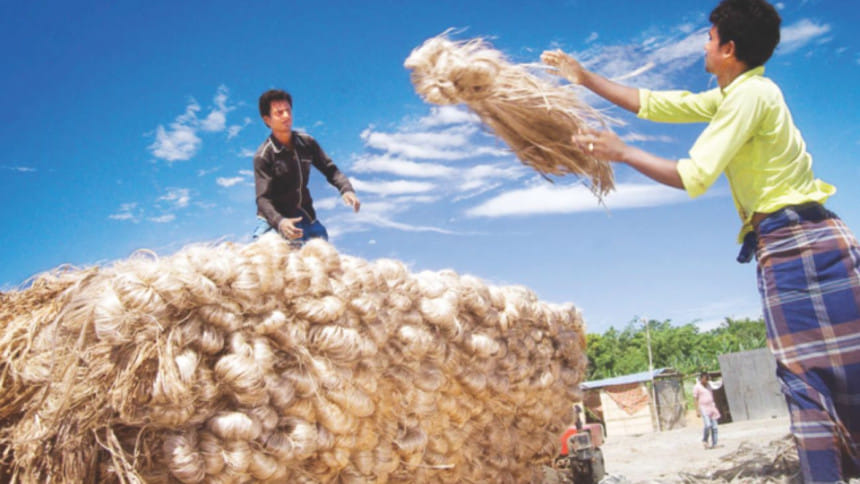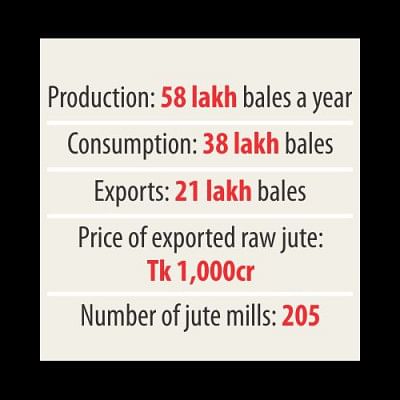Govt bans export of raw jute

The government has banned exports of all types of raw jute for an indefinite period, according to an order issued by the textiles and jute ministry yesterday.
The decision has been taken to meet the country's additional demand for jute in implementing the mandatory jute packaging law, Mirza Azam, state minister for textiles and jute, told The Daily Star.
Earlier, the government had imposed a similar ban for a month, starting on November 3.
“We will be in a crisis if we don't stop raw jute exports,” Azam said.
Bangladesh produces around 58 lakh bales of jute a year, which is equivalent to 1.04 million tonnes. The country's internal consumption is 38 lakh bales (0.68 million tonnes).

Bangladesh exports, on an average, 21 lakh bales of raw jute a year. The price of the exported raw jute is around Tk 1,000 crore, according to state-run Bangladesh Jute Mills Corporation (BJMC).
“We need an additional 17-19 lakh bales in the next nine months if we want to fully implement the jute packaging law,” Azam said.
Millers, both public and private, have hailed the latest move, saying it would bring new investment and create jobs.
Jute is the second most important fibre after cotton. It is used mainly to make cloth for wrapping bales of raw cotton, and to make sacks and coarse cloth. The fibre is also woven into curtains, chair coverings, carpets, rugs, hessian cloth, and backing for linoleum.
However, Bangladesh has failed to use this eco-friendly and biodegradable product, despite being the second biggest producer of raw jute after India. As a result, low-cost plastic products have grabbed the local market.
To promote the use of jute products, the government enacted the Mandatory Jute Packaging Act in 2010. The rules of the law were formulated in 2013, stipulating that all traders as well as government organisations must use jute bags to pack paddy, rice, pulses, wheat, fertiliser and sugar.
Even after the mandatory law, concerned organisations did not follow the rules.
In recent months, the government launched drives to promote jute-based packaging. The minister said the producers and traders of plastic packaging materials will not be spared if they impede the use of the eco-friendly jute bags.
“Raids through mobile courts are on across the country,” Azam said. “The raids will continue until the full implementation of the jute packaging law.”
Harunoor Rashid, managing director of Al-haj Jute Mills, said India is the biggest producer of jute, but the country consumes 95 percent of its jute and exports only 5 percent. “Similarly, we can make our own market that will benefit growers, farmers and millers,” said Rashid.
“But investment on research and development is a must to expand the local market for jute goods.”
Though many government agencies come under the purview of the law, there has been little interest on their part to use jute bags, let alone private enterprises and businesses, said Humayun Khaled, chairman of BJMC. “What the government agencies buy is very nominal compared to their requirement,” Khaled said.
Khondaker Golam Moazzem, additional research director of Centre for Policy Dialogue, said full enforcement of the packaging law will create demand for 84 crore jute bags a year for selected agricultural and non-agricultural products.
By one estimate, about 70 percent of local raw jute will be used up in the production of those bags, he said. According to BJMC, there are 205 jute mills, including 81 jute spinners, in Bangladesh. Of them, 27 units are state-owned. All these mills employ a total of 156,549 people.

 For all latest news, follow The Daily Star's Google News channel.
For all latest news, follow The Daily Star's Google News channel. 



Comments